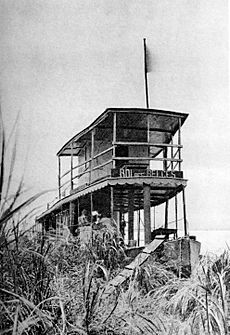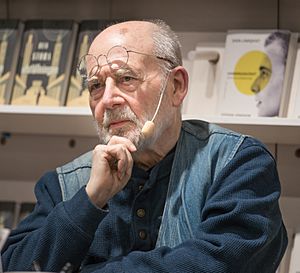Sven Lindqvist facts for kids
Sven Oskar Lindqvist (born March 28, 1932 – died May 14, 2019) was a Swedish author. He wrote many books, about 35 in total. His books included essays, travel stories, and reports. He was known for being very determined and independent in his writing.
Sven Lindqvist studied at Stockholm University. For a short time, he worked in Beijing, China, helping with cultural exchanges. Most of his life, he was a writer. In the 1970s, he started a movement called "Dig Where You Stand." This idea encouraged people to learn about history from their own local experiences. Later in his career, he focused on big global issues. These included European imperialism (when powerful countries take over others), colonialism (controlling other lands), racism, genocide (mass killings), and harm to the natural environment.
Two of his most famous books are Exterminate All the Brutes (1996) and A History of Bombing (2001). Exterminate All the Brutes talks about racism and was inspired by a phrase from the book Heart of Darkness. A History of Bombing was written in many short chapters, like a puzzle. The newspaper Svenska Dagbladet said Lindqvist was one of the most important writers in modern Swedish literature. He won many top awards for his writing.
Contents
Who Was Sven Lindqvist?
Early Life and Education
Sven Lindqvist was born in Stockholm, Sweden, on March 28, 1932. He earned a special degree called a PhD from Stockholm University. This was for his studies in the history of literature. He also received an honorary degree from Uppsala University. In the early 1960s, he lived in Beijing, China, for two years. He worked at the Swedish embassy there, helping with cultural activities.
A Life of Writing
Sven Lindqvist wrote around 35 books. These books covered many different topics. He wrote essays, which are short pieces of writing about a subject. He also wrote travel books, telling about his journeys. His books have been translated into many languages, like English, French, German, and Spanish. He also wrote articles for Swedish newspapers. His books Exterminate all the Brutes and A Lover's Diary are considered Swedish classics.
Lindqvist's books were mostly non-fiction. This means they were based on facts and real events. He often wrote about developing countries in Africa, China, India, and Australia. In the 1960s, he spent two years in China. He was very interested in the legend of an old Chinese painter named Wu Tao Tzu. The story says the painter walked into his own painting and disappeared!
Exploring Big Ideas
In the 1970s, Sven Lindqvist started the "Dig Where You Stand" movement in Sweden. This movement encouraged people to research and write about history from their own local experiences. It was a way for ordinary people to tell their stories.
Later in his career, from the late 1980s, Lindqvist focused on serious global issues. He wrote about European imperialism and colonialism. These are about how powerful countries took control of other lands and peoples. He also explored racism, genocide (the killing of a large group of people), and how humans harm the natural environment. He looked at how these problems were connected to Western ideas and history.
A Swedish newspaper called Svenska Dagbladet said he was one of the most important authors in modern Swedish literature. He was praised for exploring life and the world for over 50 years. He did this in a very determined and independent way. He was known for his deep knowledge and constant curiosity.
Personal Life
Sven Lindqvist was married to Cecilia Lindqvist, who studied China, from 1956 to 1986. They had two children together. After they divorced, he married Agneta Stark, an economist. He lived in Stockholm, Sweden. Sven Lindqvist passed away on May 14, 2019, when he was 87 years old.
Important Books
Terra Nullius
One of Lindqvist's well-known books is Terra Nullius, published in 2007. The title means "Empty Land" in Latin. The book is about how white settlers impacted the Australian landscape and its Aboriginal people. It also includes his travel writings, which are often described as beautiful.
The book discusses how the land and people were affected by things like British nuclear weapons tests. These tests happened in Australia from 1953 to 1963. They left dangerous plutonium dust spread over many miles of land. Lindqvist pointed out that the land would remain radioactive for a very long time. He also noted that these weapons could turn the whole world into an "empty land."
Exterminate All the Brutes

Sven Lindqvist said his favorite book was Exterminate All the Brutes, published in 1996. The title comes from a phrase in Joseph Conrad's 1899 story Heart of Darkness. This phrase is spoken by a character named Mr. Kurtz, who shows extreme cruelty and racist ideas.
As a boy, Lindqvist saw a photograph of very thin bodies from a concentration camp. He felt that this image and Conrad's story were connected. In his book, he argued that ideas about imperialism and racial superiority were common in the Western world. He believed these ideas influenced terrible events like the Holocaust. Lindqvist suggested that such racist ideas had already caused millions of deaths before they were applied to white people. His book led to more studies about how colonial cruelties affected Nazi crimes.
A History of Bombing
His 2001 book, A History of Bombing, was highly praised by critics. It was first published in Swedish in 1999. The book focuses on the history of strategic bombing, which is bombing cities or large areas to destroy an enemy's ability to fight.
The book has a unique structure, with 399 short chapters. Lindqvist described it as "a maze with twenty-two entrances and no exit." This was meant to show the confusion caused by strategic bombing. Each section is numbered, and many point to other numbers in the book, like a hypertext network. The book argued that the terrible things Europeans did in their colonies came before the violence they committed against each other at home. For example, strategic bombing in colonies was a step towards similar tactics used during World War II.
Awards and Recognition
Sven Lindqvist received many important awards for his writing and journalism:
- 1967 Svenska Dagbladets litteraturpris
- 1969 Doblougska priset
- 1969 Stora Journalistpriset
- 1973 Litteraturfrämjandets stora pris
- 1993 Aniara-priset
- 1999 Lotten von Kraemers pris
- 2000 Kellgrenpriset
- 2008 Svenska Akademiens essäpris
- 2011 Ivar Lo-priset
- 2012 The Lenin Award (a lifetime achievement award)
See also
 In Spanish: Sven Lindqvist para niños
In Spanish: Sven Lindqvist para niños



